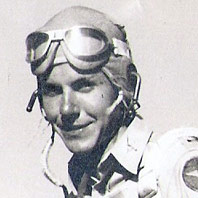TV Program Description
Original PBS Broadcast Date: December 18, 2007
In the early 1950s, epic battles unfolded in the skies over
North Korea as American and Russian fighters faced off in
history's first jet war. This program explores the Korean
War's aerial tactics, technology, and grim aftermath for
downed pilots, many of whom disappeared without a trace.
The Korean War pitted the two most advanced fighters of their
day, the American F-86 Sabre and the Soviet MiG-15, in furious
air battles in North Korea's notorious "MiG Alley." With the
help of dramatic reconstructions, rare archival footage, and
interviews with veteran American and Soviet pilots, NOVA puts
viewers in the cockpit to experience the lethal split-second
duels that erupted in MiG Alley.
"Missing in MiG Alley" investigates the pioneering engine
technology and cutting-edge aerodynamic designs that gave both
the Sabre and MiG their phenomenal performance capabilities
(see
MiG vs. Sabre Anatomy). The MiG, for example, was a brilliant blend of borrowed
elements: Like the Sabre, the MiG's raking swept wing was
inspired by the Nazi high-speed, swept-wing fighter design,
while its engine was a direct copy of an advanced Rolls-Royce
model that the British rashly handed over to the Russians in a
post-war trade agreement. Both fighters were so well matched
that human factors—superior training and
tactics—as well as plain luck proved to be crucial in
deciding MiG Alley's harrowing dogfights.
The program also follows the poignant efforts of family
members to trace what happened to airmen who disappeared over
50 years ago. The files are still open on over two dozen Sabre
pilots who were shot down behind enemy lines and whose fate
has never been definitively established. Years after the
Korean War ended in 1953, rumors persist of pilots held
captive by the Soviets. (For more on efforts to find missing
service personnel, see
Bringing Home MIAs.)
Although the Soviet Union was not officially a combatant in
the Korean War, it supplied its latest aircraft, the MiG-15,
to North Korea and China, and the skill of the MiG pilots soon
caused Americans to suspect they were dealing not just with
Soviet planes but with Soviet pilots, who were among the best
in the world.
"Neither before nor after the war were we allowed to reveal
that we were going to fly for the North Koreans," MiG pilot
Sergei Kramarenko tells NOVA. Kramarenko was one of the top
Soviet aces of the war. In addition to helping their North
Korean allies, the Soviets were eager to test their planes and
pilots against the U.S. Air Force as a proving ground for a
possible World War III.
But the Soviets' intense interest in the capabilities of U.S.
jets was bad news for captured Sabre pilots, since it often
led to harsh questioning by Soviet interrogators. Former POW
Michael DeArmond tells NOVA that he "became more and more
concerned about the purpose of this Russian running my
interrogation, because one of my frankly deepest fears was to
wind up in a gulag someplace. So I tried to be the dumbest
F-86 pilot he had ever interrogated."
DeArmond's ruse worked, but he's convinced that at least three
fellow pilots were sent to Russia for further questioning.
Their fate is unknown.
In the most moving part of the program, NOVA traces the
efforts of three families to learn what happened to their
loved ones, all Sabre pilots. Russia's newly opened archives
provide some clues, while the Chinese are now receptive to
searches of Sabre crash sites on their territory.
At the climax of the film, one such search yields stirring
clues to the fate of a missing Sabre pilot: the sole of a
shoe, a watchband, a rusted pocket knife, and a handful of
bones hint at his identity. A DNA analysis of the bones
finally brings closure to a grieving son after more than half
a century.

Program Transcript
Program Credits


